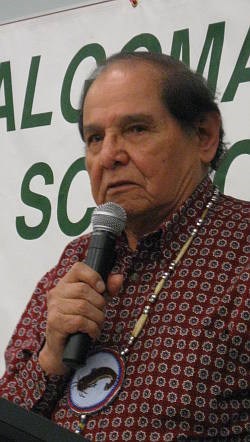The grand chief of the Three Fires Midewiwin Society, the keepers of traditional Anishinabe knowledge and values, wants everyone to know he is not aboriginal.
Eddie Benton-Banai is a member of the Fish Clan.
He's the academic/ spiritual advisor at Shingwauk University.
A spiritual teacher of the Lac Court Orielles Band of the Ojibway Nation from Wisconsin and a co-founder of the American Indian Movement.
But not aboriginal.
Speaking today at Shingwauk Hall, Benton-Banai talked about Anishinabe children and negative stereotypes.
"I want you to understand something I'm going to say to you right now," he told the Algoma District School Board's North East Regional Aboriginal Symposium.
"We are not aboriginal. I am not abnormal. I am original and part of the original people of this part of the world. We are the Anishninabe people."
Benton-Banai said educators need not wonder why so many Anishinabe people drop out of school or sit quietly without asking questions.
"How many kids have you turned away because you didn't understand the questions they were asking," he said. "How many sit in silence because they are afraid you will ridicule them?"
He asked the nearly 200 educators listening to him to challenge the negative stereotypes they've learned from their own parents, grandparents and educators.
"I am not a drunk Indian," he said. "My grandchildren know me as a sober, kind and loving grandfather and they look forward to going to school because they know who they are."
Benton-Banai said his grandchildren love school because they speak their own language and learn about their culture, clan system and values there.
As well as the academic skill needed to get a good job.
"And we do want good jobs," he said. "I worked for years as an ironworker and even though it paid well it wasn't a good job."
"I want three secretaries and to be able to sit at a desk all day," he said. "I don't want to have to lift heavy things or work in dangerous places."
He also said that Anishinabe are trying to remind others there is but one Creator and only one earth.
"We don't want to own it, we want to share it," Benton-Banai said. "Water and food is sacred and it was given to us to share."
Benton-Banai invited symposium participants to learn more about Anishinabe responsibilities as assigned by the Creator, by researching the Seven Prophesies and Three Fires Midewiwin Society.
"The road to knowledge is eternal," he said. "You can never know everything about anything."
He said the four races of people - black, red, white and yellow - are all children of the Creator and each has a role to play in the world and in the education of our children.
"We need to know more about each other," Benton-Banai said. "And we need to start with respect and thankfulness."
One suggestion he made is to start each school day with a prayer of thanks and appreciation for the gifts we are given and that the prayers be from different faiths each day, so our children can learn more about other cultures and tear down negative cultural, religious and racial stereo types.
The symposium continued today with workshops and a visit from Ontario Education Minister Kathleen Wynne.
It wraps up tomorrow.
